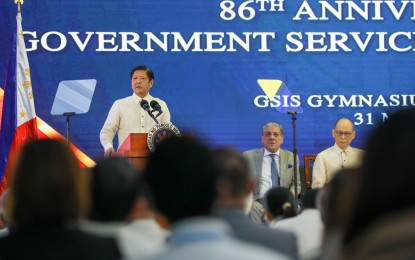
GSIS ANNIVERSARY. President Ferdinand R. Marcos Jr. delivers a speech during the 86th anniversary of the Government Service Insurance System (GSIS) at its headquarters in Pasay City on Wednesday (May 31, 2023). Marcos hailed the GSIS’ involvement in the ongoing "comprehensive and multisectoral" discussions on the proposed military and uniformed personnel (MUP) pension reform. (PNA photo by Rey Baniquet)
MANILA – President Ferdinand R. Marcos Jr. on Wednesday sought the "active and continuing" support of the Government Service Insurance System (GSIS) for his administration's proposed reform to the pension scheme of the military and uniformed personnel (MUP).
Marcos expressed his gratitude to the GSIS for its involvement in the ongoing "comprehensive and multisectoral" discussions on the proposed MUP pension reform.
"In our conscious and collective effort to make sure that no one gets left behind in our road to economic transformation, I take this opportunity to enlist the active and continuing support of the GSIS regarding a special matter. The pension system of our military and uniformed personnel is such a monumental task, with all the legal and financial setbacks that it has encountered," he said in his speech during the 86th-anniversary celebration of GSIS in Pasay City.
"Comprehensive, multisectoral discussions are now ongoing. And I thank GSIS for your involvement and participation because your experience and your acquired skills have been an important part of this ongoing process."
The departments of finance, budget, defense, and the interior and local government have started discussions and consultations with concerned agencies and stakeholders to come up with a "reasonable" proposal to reform the MUP's pension system.
Under the current pension scheme, MUP are granted one rank higher upon retirement with their monthly pension automatically indexed to the salary of personnel in active service.
Marcos expressed hope that the GSIS would continue to be involved in the ongoing talks, given its expertise and credibility, especially in the areas of fund management, maintaining actuarial solvency and strategic income-generating activities.
"We genuinely recognize that it (MUP's pension fund) is as important, urgent, and humanitarian as the pension system of all civilian government employees," he said. "Hence, it is imperative that we establish the most appropriate and strategic mechanism to get it functioning or at the very least, to start to lay the foundation for the system that will function in the long run."
Going digital
Meanwhile, the President hailed the GSIS' digitalization efforts, allowing the state pension fund to do just "4.6 percent" of its operations over the counter.
Marcos expressed hope that the GSIS' initiatives to digitize most of its services would be emulated by all government agencies.
"Given the demands of these complex operations, it is highly crucial that digital transformation be fully embraced, especially in this era of rapid technological advancement. And we must ensure an efficient organization, accuracy, reliability, and security of data, using the state-of-the-art digital tools that are available," he said.
"GSIS turns out, leads the way. The primary clientele itself, the Filipino civil servant, stands to great benefit from this digitalization effort. It will not only improve the delivery of services but will also boost satisfaction, morale, and productivity of government workers."
Marcos also lauded the GSIS for staying "strong, vital, and relevant" and urged the agency to maintain its "positive" image with the same vigor and diligence to ensure its organizational resilience.
He ensured that his administration would provide full support for the GSIS as it continues to serve about 2.5 million government workers, including the highest public officials.
"As president, I assure you of the administration's support for all your initiatives as you better yourself for the sake of our very diligent government workers. Continue upholding, professionalism, integrity, and service excellence on the journey to the next century," he said.
The GSIS officially began its operations on the same day in 1937 with 58 employees, then offering only life insurance.
Eight decades later and with the advent of information technology, GSIS members enjoy fast and convenient service through the cumulative efforts of the agency's past and present personnel.
The GSIS Touch mobile application and the GSIS Pabahay project in Quezon City were also launched during the agency’s 86th-anniversary celebration.
In support of the administration’s thrust to provide accessible and affordable food commodities for Filipinos, the GSIS also allowed accredited Kadiwa farmers cooperatives and associations from different regions to sell agricultural and fishery products to its employees, members, pensioners, and visitors. (PNA)
